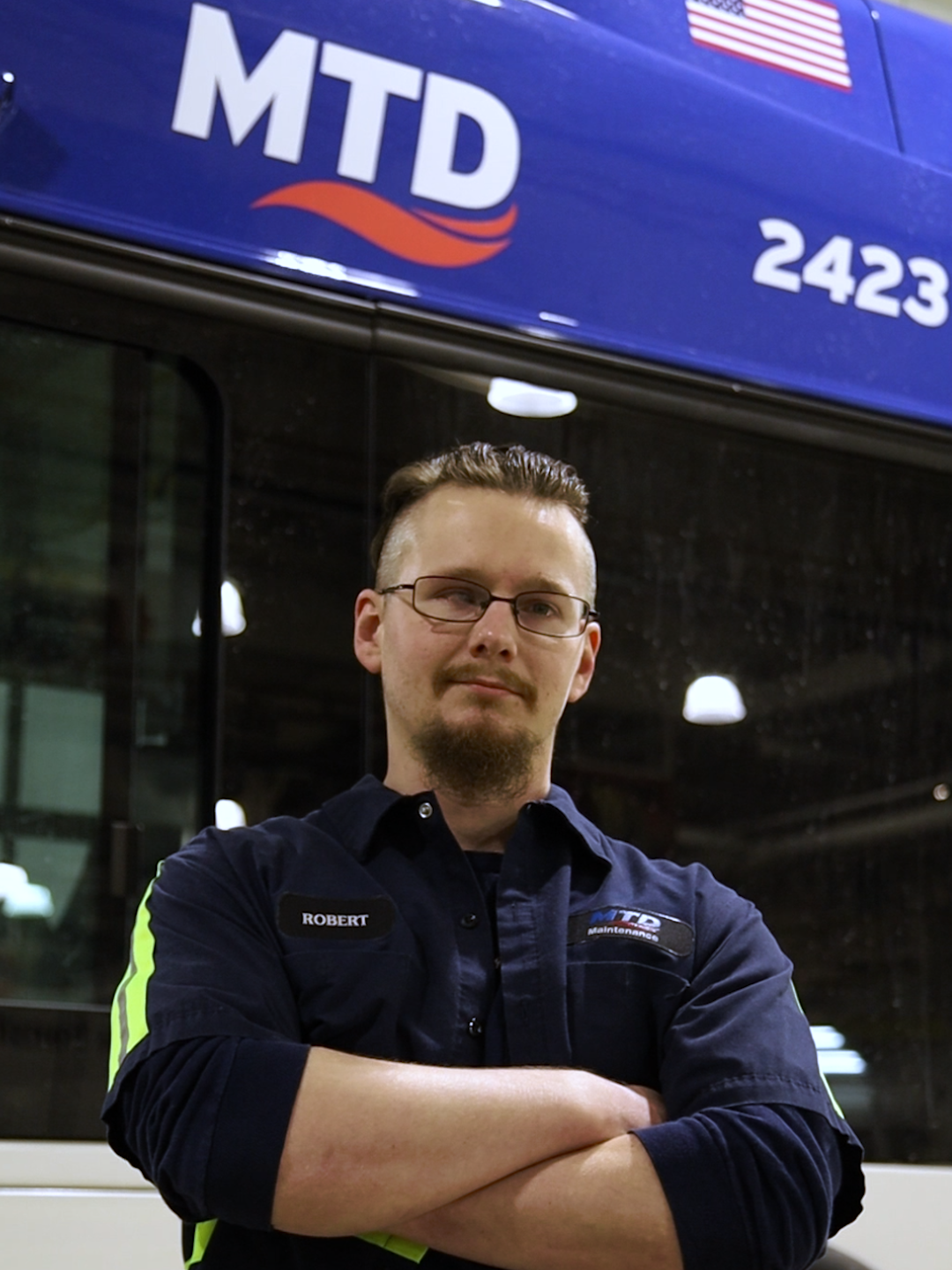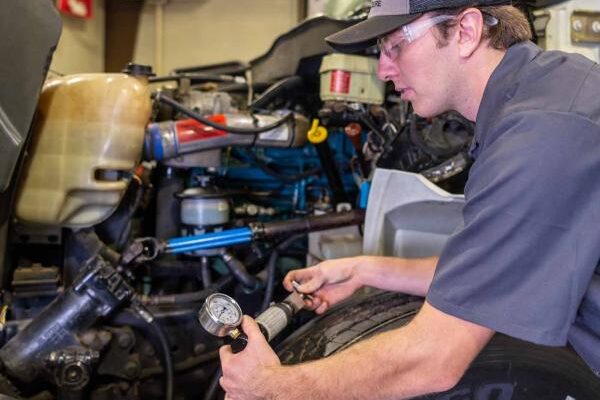College Partnerships in Public Transportation Workforce Development
College Partnerships in Public Transportation Workforce Development
Key takeaways
- Local colleges can be effective partners for transit agencies, given their existing capacity to provide technical education, their expertise with navigating apprenticeship registration and other administrative processes, and the potential for “plug and play” approaches in which existing foundational curricula can be adapted for transit-specific programs.
- College partnerships provide an opportunity for employers to pool demand for training, with a college-based program supporting multiple transit agencies or other employers that need workers with similar skills. This approach can enable training programs to achieve the scale necessary to be viable.
- College partnerships can support a range of training approaches, including internships, registered apprenticeship, specialized technical training, and professional development for frontline supervisors and other employees.
- Partnerships can also support recruitment by leveraging colleges’ expertise with outreach and community engagement.
Community colleges and other postsecondary institutions are leading providers of workforce education in the United States. Increasingly, transit agencies are partnering with local colleges to recruit and train new frontline workers and to upskill existing workers. Transit agencies and colleges, along with labor and community partners, have collaborated in unique ways based on their specific circumstances and needs. Developed through original research, this set of TWC mini case studies features summaries of those efforts, documenting three distinct approaches to partnering with local colleges.
Previously documented college partnerships in transit
Existing resources have featured examples of higher education institutions’ involvement in transit workforce development, including through partnerships that support joint labor-management-sponsored registered apprenticeship and college-based technical certificate programs. Check out the links below for more information on these established models:
- Santa Clara Valley Transportation Authority (VTA) and Amalgamated Transit Union (ATU) Local 265’s Joint Workforce Investment (JWI) program, in partnership with Mission College
- Golden Gate Transit (GGT) and ATU Local 1575’s Workforce Investment Network (WIN), in partnership with the College of Marin and Santa Rosa Junior College
- IndyGo, ATU Local 1070, and Ivy Tech Community College’s apprenticeship program in diesel technology
- AC Transit and ATU Local 192’s partnership with the Chabot-Las Positas Community College District to help launch the agency’s Zero Emission Bus University

Registered Apprenticeships can be sponsored by higher education institutions and by joint labor management partnerships; transit agencies often partner with frontline labor unions to create jointly sponsored apprenticeship programs. More information is available on TWC’s Apprenticeship and Mentorship information page.
Champaign-Urbana Mass Transit District (MTD) and Parkland Community College
Champaign-Urbana Mass Transit District (MTD) in eastern Illinois partners with Parkland Community College to support internship and apprenticeship programs. After maintenance staff noticed a decline in job applications, mainly among people under the age of 30, MTD began the process of expanding its training pathways. The agency had strong retention rates but would usually receive only one or two applications for vacant maintenance positions, typically from unqualified candidates. In 2021, in an effort to establish recruitment pipelines, the agency worked to expand its existing internship program, while also working with Parkland Community College to establish a registered apprenticeship program.

College-based training and upskilling programs can be offered on a credit or non-credit basis. Research has found that earning an industry credential or college credits can enhance individuals’ economic mobility. The question of how to structure the program and whether to offer a transferable credential may involve factors including start-up time and costs. Agencies can consult with potential college partners and other stakeholders to clarify available options and any administrative or cost differences that may arise.
Parkland’s prior experience and dedicated office for apprenticeship and internship were crucial resources, and the college serves as the formal sponsor of the registered apprenticeship (MTD is a non-union agency; typically, when the workforce is represented, the program is jointly sponsored by the agency and the union local). MTD selected an existing certificate program at Parkland, which included five automotive courses, to use for its apprenticeship. Apprentices earn an Automotive and Light Repair Certificate while MTD provides on-the-job training and funding for schooling and books. College staff sometimes recommend specific students to MTD as potential candidates for apprenticeship. The partnership has also facilitated knowledge sharing between the transit agency and college, as members of the MTD maintenance management team serve on advisory boards at Parkland.
The internship is conducted outside of the partnership with Parkland, but interns have an opportunity to determine if transit is a field they are interested in; in several cases, interns at MTD have applied for the apprenticeship program.
Training program participants work alongside a technician for the entirety of the program. MTD found that some candidates were initially deterred by maintenance work schedules, but that apprenticeship could get people in the door and introduce the benefits of a career in transit. Apprentices are guaranteed a job upon successful program completion.

PennTRAIN and Pennsylvania College of Technology
As transit ridership in Pennsylvania was recovering from the COVID-19 pandemic, a group of small- and medium-sized agencies came together to explore options for initiating a transit bus maintenance registered apprenticeship program. Doing so at the transit agency level was not feasible for these locations individually, as many do not have sufficient in-house training resources to deliver a full bus maintenance apprentice training curriculum. Still, establishing more robust training pathways was a priority, as many agencies are experiencing an increased number of retirements and a lack of qualified candidates. Initially, the agencies partnered with a local college to offer credit-bearing training courses, but that institution closed its doors. A transit agency board member subsequently connected the group with Pennsylvania College of Technology (Penn College), a Penn State affiliate that offers workforce-oriented programs.
Penn College had deep experience with establishing registered apprenticeship programs; since its first program was established in 2017 it had developed nine apprenticeships in manufacturing and energy. Faculty members were enthusiastic about the idea of initiating a transit apprenticeship despite the potential challenges of branching out into a new industry. Penn College’s existing capacity and curriculum for vehicle maintenance training is being leveraged to develop the new transit bus maintenance program, which is in the process of being registered at the state level.

For locations seeking to partner with other employers (transit or otherwise) to support a college-based training program, consider how to account for differences in equipment across locations. Original equipment manufacturer-agnostic training with the college partner can be combined with equipment-specific on-the-job training at the transit agency.
Eligible program participants are those employed by agencies that are members of the PA Transportation Resource and Information Network (PennTRAIN). The program is supported by a state grant that emphasizes barrier remediation; the college plans to partner with a community-based organization to provide support to trainees around housing, transportation, budgeting, childcare, and other needs. As participants hail from different parts of the state and from multiple transit agencies, the program runs on a hybrid model, mixing online coursework, on-campus training at Penn College, and on-the-job training at each transit location. The program launched its first class in July of 2025 with 14 participants from eight different agencies in the first cohort.

Training is focused on compressed natural gas (CNG) bus maintenance and safety, with additional emphasis on diesel. The program is in the process of being registered with the state apprenticeship standards office. While completing the apprenticeship does not currently automatically confer college credits, the program’s organizers are exploring options for connecting the training program with Penn College’s existing apprenticeship technology associate’s degree.
GCRTA & Tri-C
Greater Cleveland Regional Transit Authority (GCRTA), the agency serving Ohio’s second-largest city and its metro area, has developed a long-standing partnership with Cuyahoga Community College (Tri-C), engaging in multiple initiatives to support recruitment, training and assessment, and community engagement. The partnership began in the early 2000s and has expanded and evolved in response to specific goals arising from GCRTA’s workforce development needs.
GCRTA’s partnership with Tri-C has helped the agency expand its visibility and outreach in the community. Tri-C has established several access centers in city neighborhoods that had few existing educational and job search resources. In 2021, GCRTA staff approached Tri-C about the possibility of the agency itself serving as an access center or otherwise becoming more involved in community outreach. The partners developed the Community Training & Job Hub, which has enabled GCRTA to host recruitment events at Tri-C’s access centers and to have a presence at community service events, building trust and awareness within the community. This effort helped meet GCRTA’s dual goals of connecting more with riders and expanding employee recruitment efforts. After pre-screening job applicants, GCRTA can conduct interviews and extend contingent offers in-person at recruitment events. Jobseekers who are unable to complete their applications earlier can do so at an access center using the college’s computers.

Consider whether agency employees will be responsible for any costs associated with completing a training program. Because some workers may struggle to pay for training, agencies may choose to hire candidates before training or pay training costs up front.
In addition, GCRTA’s partnership with Tri-C has facilitated the development of frontline training initiatives. The agency donated two buses to Tri-C’s Transportation Innovation Center to support maintenance and CDL training programs for Tri-C students, some of whom seek out opportunities at GCRTA. The agency benefitted from the college’s instructors’ expertise in developing a bus maintenance apprenticeship program, jointly sponsored with Amalgamated Transit Union (ATU) Local 268. GCRTA also used Tri-C as a commercial driver’s license (CDL) training center, which helped to expand capacity during a period of intensive hiring. Although GCRTA has moved CDL training in-house (which it provides for new operators), new hires still complete CDL testing at Tri-C. The potential of initiatives to evolve based on both partners’ needs was described by GCRTA staff as a strength of the partnership.
Another key point of collaboration between GCRTA and Tri-C is frontline supervisor training. Tri-C’s Corporate College offers supervisor and management training courses, including options for Lean Six Sigma certification. After internal employee surveys showed that there was a need for more robust supervisor training, GCRTA made the previously optional training mandatory, with all frontline supervisors and managers at GCRTA required to participate in Corporate College courses. Tri-C also facilitates training for GCRTA’s board. Several frontline workers have advanced at GCRTA after participating in Corporate College classes, including a mechanic, bus operator, and police officer who were featured in the college’s 20th anniversary showcase.
Contributing authors: Doug Nevins, Michaela Boneva, Shayna Gleason





